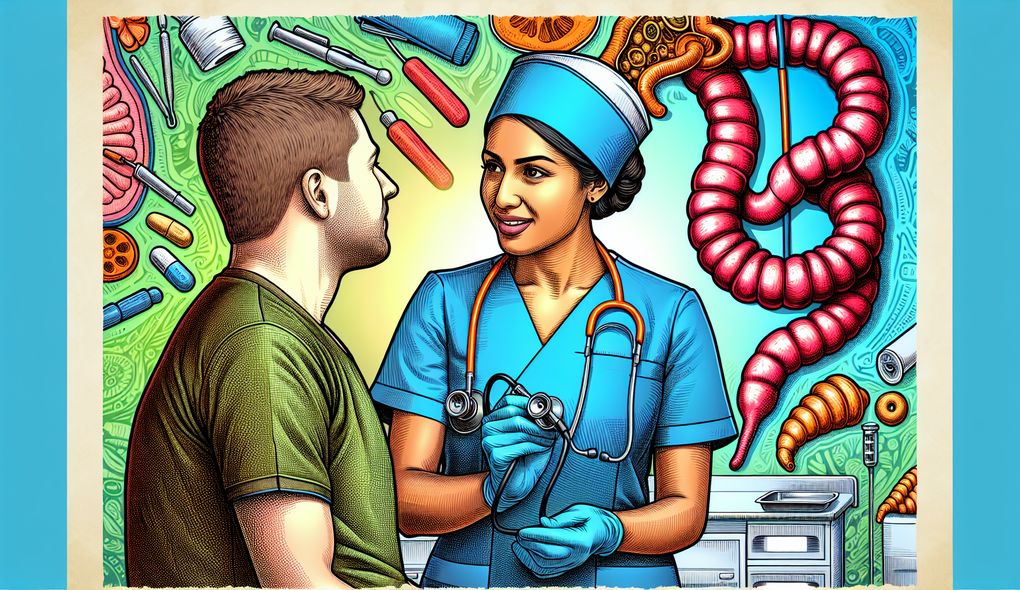What do you consider when developing a patient's treatment plan?
JUNIOR LEVEL

Sample answer to the question:
When developing a patient's treatment plan, I consider several factors. First, I review the patient's medical history and conduct a comprehensive assessment to understand their current condition. I also take into account any previous treatments and their outcomes. Additionally, I consider the patient's preferences and goals for their healthcare. I collaborate with the multidisciplinary team, including gastroenterologists and other healthcare professionals, to develop a tailored treatment plan. We discuss evidence-based practices and the latest research in gastroenterology to ensure the plan is up-to-date. Throughout the process, I maintain open communication with the patient, providing education and addressing any concerns they may have.
Here is a more solid answer:
When developing a patient's treatment plan, I take a comprehensive approach. Firstly, I thoroughly review the patient's medical history and evaluate their current condition through detailed patient assessments, including physical examinations and diagnostic tests. I analyze the results and collaborate with gastroenterologists and other healthcare professionals to determine the most appropriate treatment options based on evidence-based guidelines. I also consider the patient's individual preferences and goals for their healthcare, ensuring their active involvement in the decision-making process. Additionally, I constantly update my knowledge of gastrointestinal diseases and treatments through continued learning and attending relevant conferences. This ensures that I provide the highest standard of care and stay informed about emerging best practices in gastroenterology.
Why is this a more solid answer?
The solid answer expands on the basic answer by providing specific details and examples. It demonstrates proficiency in conducting comprehensive patient assessments, collaborating within a multidisciplinary team, and commitment to evidence-based practice and continued learning. However, it could further improve by including more examples of strong clinical judgment and critical thinking in managing complex cases.
An example of a exceptional answer:
Developing a patient's treatment plan requires a multifaceted approach that encompasses various considerations. Firstly, I conduct a thorough review of the patient's medical history, paying close attention to their gastrointestinal health. To gain a comprehensive understanding of their current condition, I perform detailed patient assessments, such as in-depth physical examinations and advanced diagnostic tests. These evaluations allow me to accurately identify the underlying cause of their symptoms and determine the most appropriate treatment options. When managing complex cases, I apply strong clinical judgment and critical thinking skills to analyze the nuances of the patient's condition and make well-informed decisions. I collaborate closely with gastroenterologists and other specialists to ensure the treatment plan aligns with the latest advancements in gastrointestinal medicine. Additionally, I prioritize open and effective communication with the patient, actively involving them in the decision-making process and addressing any concerns they may have. I regularly engage in professional development activities, such as attending conferences and participating in workshops, to stay updated on the latest research and evidence-based practices in gastroenterology. By combining my knowledge, skills, and commitment to delivering patient-centered care, I create treatment plans that optimize the patient's gastrointestinal health and overall well-being.
Why is this an exceptional answer?
The exceptional answer provides a highly comprehensive response to the question. It demonstrates excellent communication and interpersonal skills, proficiency in conducting comprehensive patient assessments, strong clinical judgment and critical thinking in managing complex cases, and knowledge of gastrointestinal diseases and treatments. The candidate also showcases their commitment to evidence-based practice and continued learning. The answer is detailed, specific, and showcases the candidate's expertise and dedication to providing optimal patient care.
How to prepare for this question:
- Familiarize yourself with evidence-based guidelines and research related to gastrointestinal diseases and treatments. Stay updated on the latest advancements in the field.
- Reflect on past experiences where you demonstrated strong clinical judgment and critical thinking skills in managing complex cases.
- Practice explaining complex medical concepts to patients in a clear and understandable manner. Communication skills are key in developing a treatment plan.
- Highlight your ability to work collaboratively within a multidisciplinary team. Share examples of successful collaborations and effective communication with healthcare professionals in your previous roles.
- Demonstrate a proactive attitude towards continuing education and professional development. Discuss any relevant certifications, conferences, or workshops you have attended or plan to attend.
What are interviewers evaluating with this question?
- Excellent communication and interpersonal skills
- Ability to work collaboratively within a multidisciplinary team
- Proficiency in conducting comprehensive patient assessments
- Strong clinical judgment and critical thinking in managing complex cases
- Knowledge of gastrointestinal diseases and treatments
- Commitment to evidence-based practice and continued learning

